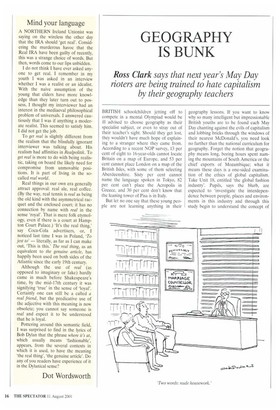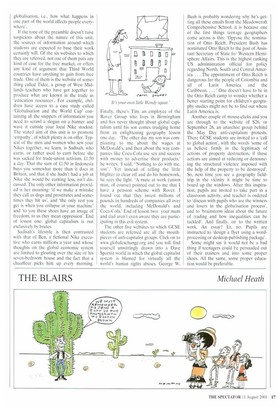GEOGRAPHY IS BUNK
Ross Clark says that next year's May Day
rioters are being trained to hate capitalism by their geography teachers
BRITISH schoolchildren jetting off to compete in a mental Olympiad would be ill advised to choose geography as their specialist subject, or even to stray out of their teacher's sight. Should they get lost, they wouldn't have much hope of explaining to a stranger where they came from. According to a recent NOP survey, 13 per cent of eight to 16-year-olds cannot locate Britain on a map of Europe, and 53 per cent cannot place London on a map of the British Isles, with some of them selecting Aberdeenshire, Sixty per cent cannot name the language spoken in Tokyo, 82 per cent can't place the Acropolis in Greece, and 30 per cent don't know that the leaning tower of Pisa is in Italy.
But let no one say that these young people are not learning anything in their geography lessons. If you want to know why so many intelligent but impressionable British youths are to be found each May Day chanting against the evils of capitalism and lobbing bricks through the windows of their nearest McDonald's, you need look no further than the national curriculum for geography. Forget the notion that geography means long, boring hours spent naming the mountains of South America or the chief exports of Mozambique; what it means these days is a one-sided examination of the ethics of global capitalism. Take Unit 18, entitled 'the global fashion industry'. Pupils, says the blurb, are expected to 'investigate the interdependence between people, places and environments in this industry and through this study begin to understand the concept of globalisation, i.e., how what happens in one part of the world affects people everywhere'.
If the tone of the preamble doesn't raise suspicions about the nature of this unit. the sources of information around which students are expected to base their work certainly will. Of the six websites to which they are referred, not one of them puts any kind of case for the free market, or offers any kind of argument that Third World countries have anything to gain from free trade. One of them is the website of something called Tidec, a group of West Midlands teachers who have got together to produce what are known in the trade as 'education resources'. For example, children have access to a case study called `Globalisation and the World Cup' containing all the snippets of information you need to scrawl a slogan on a banner and wave it outside your local Nike stockist. The stated aim of this unit is to promote 'empathy', of which plenty is on offer. Typical of the men and women who sew your Nikes together, we learn, is Sadisah, who earns, or rather used to earn before she was sacked for trade-union activism. £1.50 a day. That the sum of £1.50 in Indonesia buys you somewhat more than it does in Britain, and that if she hadn't had a job at Nike she would be earning less, isn't discussed. The only other information provided is her moaning: 'if we make a mistake they call us dogs and prostitutes and sometimes they hit us', and 'the only rest you get is when you collapse at your machine' and to you these shoes have an image of freedom, to us they mean oppression'. End of lesson one: global capitalism is run exclusively by brutes.
Sadisah's lifestyle is then contrasted with that of Ben, a fictional Nike executive who earns millions a year and whose thoughts on the global economic system are limited to gloating over the size of his seven-bedroom house and the fact that a chauffeur picks him up every morning.
Finally, there's Tim, an employee of the Rover Group who lives in Birmingham and has never thought about global capitalism until his son comes trudging home from an enlightening geography lesson one day. 'The other day my son was complaining to me about the wages at McDonald's, and then about the way companies like Coca-Cola use sex and success with money to advertise their products,' he writes. said, "Nothing to do with me. son": Yet instead of telling the little blighter to clear off and do his homework, he sees the light. 'A mate at work (union man, of course) pointed out to me that I have a pension scheme with Rover. I found out that they invest millions of pounds in hundreds of companies all over the world, including McDonald's and Coca-Cola.' End of lesson two: your mum and dad aren't even aware they are participating in this evil system.
The other five websites to which GCSE students are referred are all the mouthpieces of anti-capitalist groups. Click on to www.globalexchange.org and you will find yourself unwittingly drawn into a Dave Spartist world in which the global capitalist system is blamed for virtually all the world's human rights abuses. George W. Bush is probably wondering why he's getting all these emails from the Meadowcroft Comprehensive School; it is because one of the first things teenage geographers come across is this: 'Oppose the nomination of Otto Reich. President Bush has nominated Otto Reich to the post of Assistant Secretary of State for Western Hemisphere Affairs. This is the highest ranking US administration official for policy regarding North, South and Central America. . .. The appointment of Otto Reich is dangerous for the people of Colombia and all of Latin America and the Caribbean.... ' One doesn't have to be in the Otto Reich camp to wonder whether a better starting point for children's geography studies might not be to find out where Latin America is.
Another couple of mouse-clicks and you are through to the website of S26, or September 26, an anarchist group behind the May Day anti-capitalism protests. There GCSE students are invited to a 'call to global action', with the words 'some of us believe firmly in the legitimacy of actions of property destruction, if these actions are aimed at reducing or denouncing the structural violence imposed with the help of the property to be destroyed'. So, next time you see a geography fieldtrip in the vicinity it might be time to board up the windows. After this inspiration, pupils are invited to take part in a classroom activity, and teacher is ordered to 'discuss with pupils who are the winners and losers in the globalisation process', and to 'brainstorm ideas about the future of trading and how inequalities can be tackled'. And finally, on to the written work. An essay? Er, no. Pupils are instructed to 'design a flyer using a wordprocessing or desktop-publishing package'.
Some might say it would not be a bad thing if teenagers could be persuaded out of their trainers and into some proper shoes. All the same, some proper education would be preferable.



























































 Previous page
Previous page